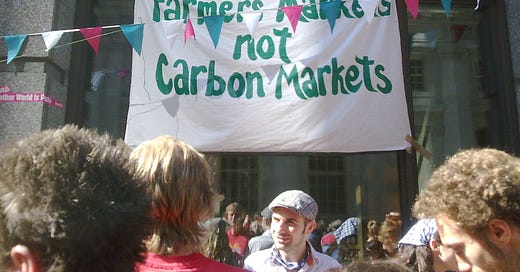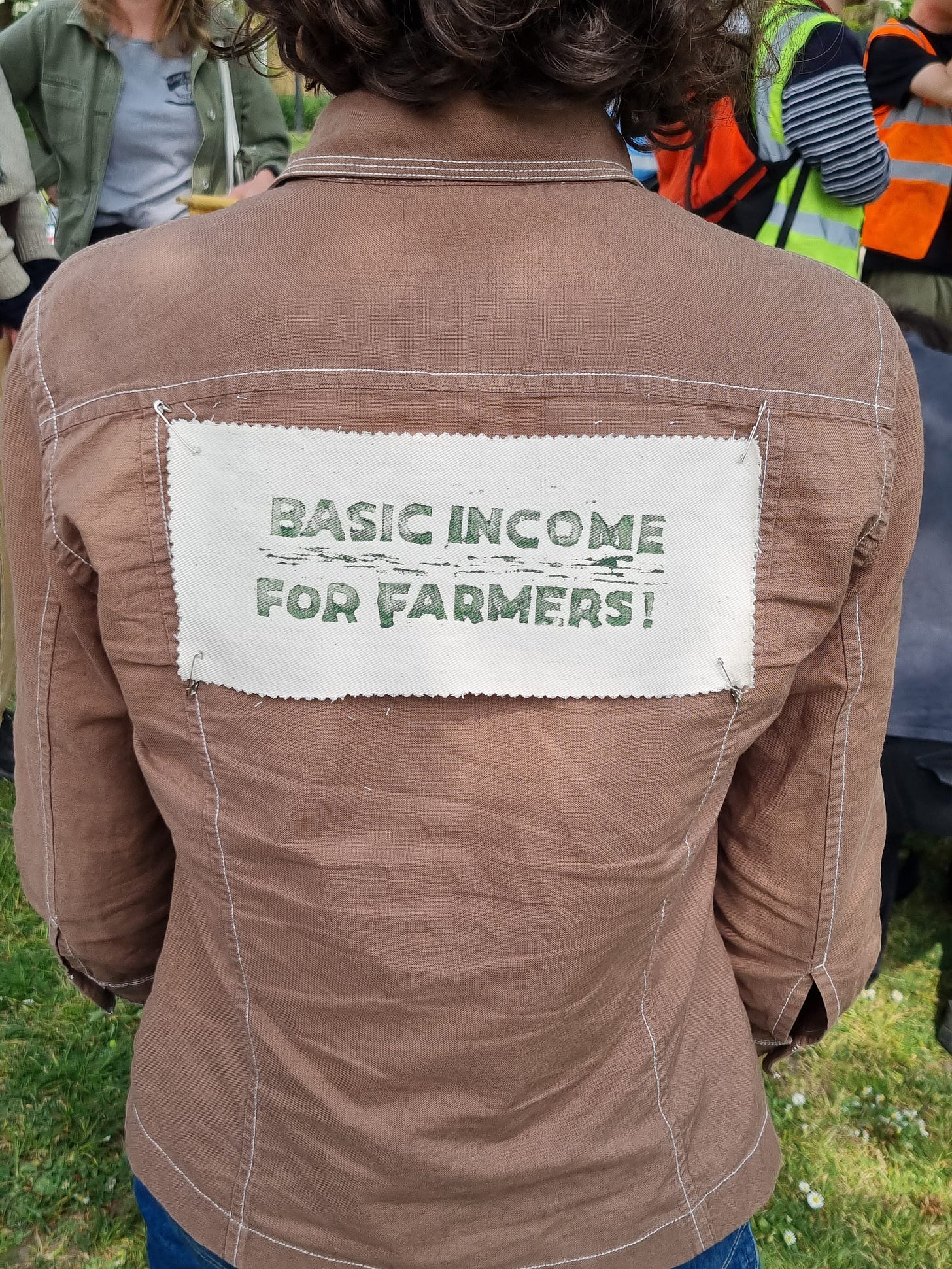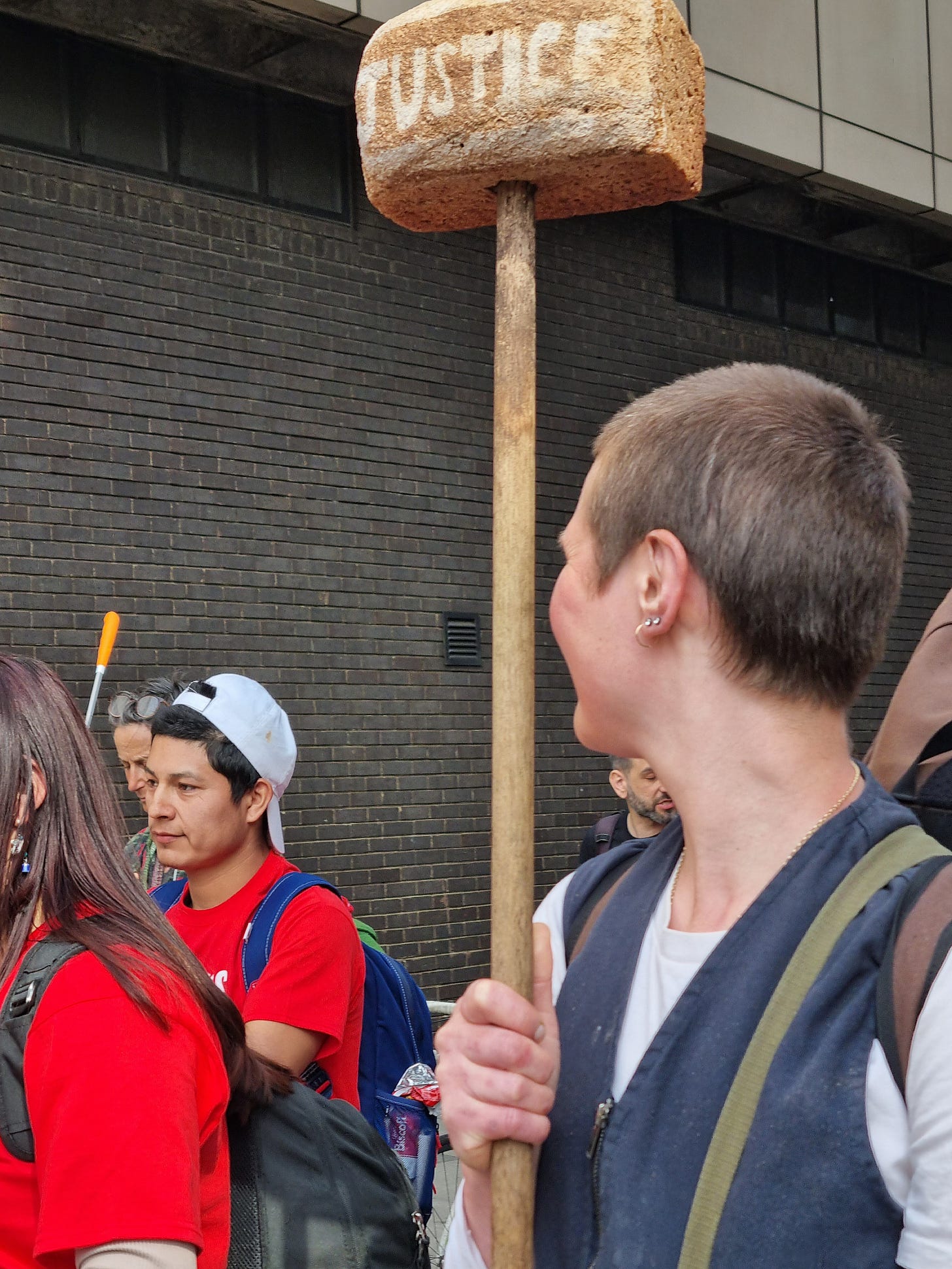Why are farmers markets still the object of ridicule?
Food in their Hands and A Basic Income for Farmers. Do farmers need a basic income to survive?
As ever, thank you for being here and reading my work. If you’ve never commented or liked and shared a post, please do. It makes me feel that my work is appreciated.
I always feel embarrassed mentioning this but the best way to support me, if you’re able to is to press the buttons to upgrade to paid.
There's another way to endorse my work if you think it’s worth paying for and a monthly or yearly subscription isn't possible;
Whatever your reason for being here, I’m so glad you’ve joined me.
Over a year ago I wrote my first piece for Substack. It was my clarion call, an impassioned piece calling for reason, balance and love for our markets, for all markets, farmers markets included. Here’s the link if you missed it the first time around.
The photo above was taken in 2009 at a takeover of the City of London during the protests against G20. I couldn’t resist the banner which seemed to sum up the mood of the protest, where bankers in their glass towers were seen waving £10 notes at people in the streets below.
And yet the mocking of farmers markets continues.
A few weeks ago The Landworkers Alliance organised a rally called Food In Our Hands, to highlight the need for food equality. For the systematic transformation of our food system. For Right to Food to be enshrined in law. For everyone to have access to good food.
I was there for a fair income for farmers and all farm workers, including seasonal workers. I was there to cheer for a bigger budget for nature friendly farming across England, Northern Ireland, Scotland and Wales. For emergency interim support for small farms. I was there to support the notion that new entrants to farming have clear, affordable improved access to land. And that the National Food Strategy for England is ambitious enough to nourish us all.
It’s a difficult and fraught time for farmers with the closure of the Land Use Framework for England and the abrupt closure of the Sustainable Farming Incentive (SFI) scheme.
Both a National Food Strategy and a 25-Year Farming Roadmap are in development. The Landworkers Alliance together with Sustain, The Sustainable Food Trust, Pasture for Life and the Food, Farming and Countryside Commission have put together their own Local Food Growth Plan and report. It affirms that a more resilient food system must be grounded in local supply chains which benefit farmers, the environment and the general public. As they note in their summary;
Changing climates and shocks to global supply chains have increased the input costs for food producers and exposed levels of unfairness in food supply chains and power imbalances between farmers, processors, manufacturers and retailers.
Local food systems can help strengthen local economies and communities, increase farm profitability, encourage the uptake of nature-friendly farming and enable a more accessible and resilient supply of healthy and affordable food.
Jyoti Fernandes is the Campaigns & Policy Coordinator for the Landworkers Alliance.
She is an agroecological smallholder with sheep, cows and orchards based in Dorset. Jyoti coordinates the Policy, Lobbying and Campaigning work of the LWA for UK wide campaigns and England specific lobbying on the agricultural transition.
Before the march began, she spoke for around 14 minutes without notes or a script about a fair, just, equitable world for all.
‘‘Governments have abandoned policies that give us the right to food and thrown everything to the global market place. And that is why we have food insecurity, that’s why we have good, healthy affordable food available in fancy farmers markets but not available to everyone else who needs food. Because it’s been left to the market.
We need strong trade rules so that our farmers and our welfare standards aren’t undermined and undercut. Market regulation. Good Subsidies systems that can support farmers livelihoods. Through market regulation so that there are good prices for farmers but also for consumers, through regulating supermarket contracts. Put them together as a package. Not one of them will solve things but you figure it out. And a land use framework where you think about all the land that’s available, as a common treasury, for all of us. How does this get used fairly? How do we stop to think about the logistics of growing enough and distribution. Skills. Jobs. Dignity.’’
It was an impassioned speech but did you notice? She called farmers markets ‘fancy’ whilst at the same time saying that they sell healthy affordable food. So what makes them fancy? Up until then I was with her. She wants a world where farmers are supported and aren’t undermined and undercut. She could have talked about food halls in the more upmarket department stores. Or the kinds of greengrocers that as
so beautifully put it, ‘curate’ instead of sell their produce. Or not singled out any place where farmers sell. To have a go at farmers markets, one of the few places where farmers get a fair price for all the hard work they put in, when at the same time you’re campaigning for justice for farmers doesn’t feel right to me. She got a huge cheer for her comment.In contrast, Jo Poulson from Basic Income for Farmers, spoke about wanting to see farmers markets in every town.
Her own background in agriculture led her to come up with the idea for a basic safety net of income to all farmers, food producers and agricultural workers, no questions asked. It would be over and above any subsidies or agri-environment schemes and provide the social and financial recognition farmers and food producers deserve for the vital public service they provide.
It’s obvious that it’s not straight forward. There’s no lowest common denominator. Many farmers face a mental health crisis, increased by the current climate we face. They do a tough job, every day, every season, whatever the weather, hardly taking a holiday, and some struggle to break even. They endure, they survive, they continue. They feed us, and they deserve better. Where the money would come from to fund such a scheme isn’t clear either and there continues to be a debate about how and whether the idea would work in practice. Last year BI4Farmers and independent think tank Autonomy, wrote a detailed report, which can be viewed here.
A few days ago on a farm visit I told the farmer I was with about the ‘fancy farmers market’ statement and asked what he’d say to Jyoti Fernandes;
‘‘I’d like to ask her to come to my stall and explain to me what’s fancy about the products I have on my table. With all respect for what they’re marching for, I fully agree. The only way to change is for customers to understand how food is produced, to see it and taste it. If supermarkets aren’t interested; okay, then how else are you going to reach a large number of customers than by what we’re doing? It’s only just getting to a point for us where we’re reaching a serious volume of people. No respect for that statement at all.’’
You can write to your MP to ask them to support the Food In Our Hands demands and ask them to support a legally enshrined Right to food in UK law.
Sign an open letter to the Minister for Food Security and Rural Affairs, asking him to explore a a basic income for farmers and farm workers
Sign the petition for a bigger, nature-friendly farming budget. Unlikely I know when the money’s run out but it never stops us asking.
Will farmers markets ever cease being called fancy. It doesn’t help farmers or consumers. What do you think? What’s the feeling in your local community?
If you’ve got this far; thank you! As it’s the season; Here’s the piece I wrote last year about asparagus history, stories, quirks and recipes.











Pressing ‘like’ doesn’t feel quite right. Substack needs an ‘agree’ button!
Such a great piece